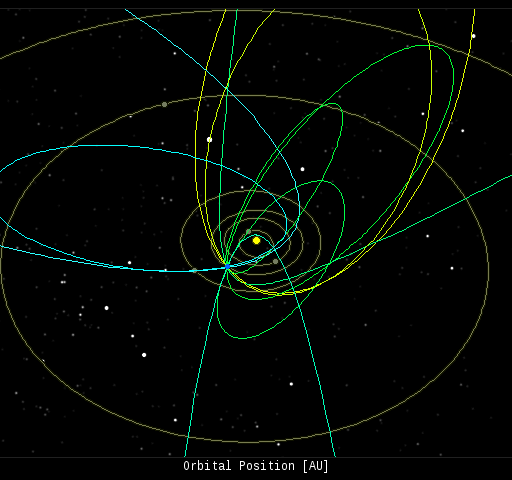Space Weather
by Dr. Tony Phillips.
 All Sky Fireball Network
All Sky Fireball Network
Every night, a network of NASA all-sky cameras scans the skies above the United States for meteoritic fireballs. Automated software maintained by NASA's Meteoroid Environment Office calculates their orbits, velocity, penetration depth in Earth's atmosphere and many other characteristics. Daily results are presented here on Spaceweather.com.
On May. 11, 2014, the network reported 9 fireballs.
(7 sporadics, 2 eta Aquariids)
(7 sporadics, 2 eta Aquariids)
In this diagram of the inner solar system, all of the fireball orbits intersect at a single point--Earth. The orbits are color-coded by velocity, from slow (red) to fast (blue). [Larger image] [movies]
Near Earth AsteroidsPotentially Hazardous Asteroids (PHAs) are space rocks larger than approximately 100m that can come closer to Earth than 0.05 AU. None of the known PHAs is on a collision course with our planet, although astronomers are finding new ones all the time.
On May 14, 2014 there were 1473 potentially hazardous asteroids.
Recent & Upcoming Earth-asteroid encounters:
| Asteroid |
Date(UT)
|
Miss Distance
|
Size
|
| 2014 HT178 |
May 8
|
5.9 LD
|
21 m
|
| 2014 JD |
May 9
|
7.7 LD
|
24 m
|
| 2014 JG55 |
May 10
|
0.3 LD
|
7 m
|
| 2014 JW55 |
May 13
|
4.3 LD
|
23 m
|
| 2014 JH15 |
May 17
|
8 LD
|
59 m
|
| 2010 JO33 |
May 17
|
4 LD
|
43 m
|
| 2005 UK1 |
May 20
|
36.7 LD
|
1.1 km
|
| 1997 WS22 |
May 21
|
47.1 LD
|
1.5 km
|
| 2002 JC |
May 24
|
48.7 LD
|
1.4 km
|
| 2014 HQ124 |
Jun 8
|
3.2 LD
|
615 m
|


No comments:
Post a Comment
Hello and thank you for visiting my blog. Please share your thoughts and leave a comment :)